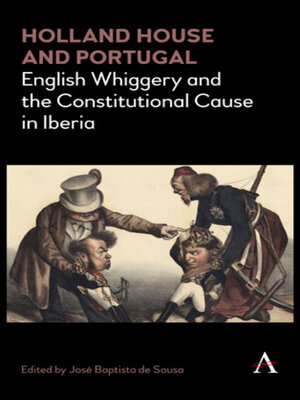Holland House and Portugal, 1793–1840
ebook ∣ English Whiggery and the Constitutional Cause in Iberia
By Jose Baptista de Sousa

Sign up to save your library
With an OverDrive account, you can save your favorite libraries for at-a-glance information about availability. Find out more about OverDrive accounts.
Find this title in Libby, the library reading app by OverDrive.



Search for a digital library with this title
Title found at these libraries:
| Library Name | Distance |
|---|---|
| Loading... |
'Holland House and Portugal', a study in political and diplomatic history, focuses on the relations between Lord Holland and Portugal from 1793 to 1840. The book traces the evolution of Holland's views on Portugal from the time of his first visit to Spain to his later contribution to the establishment of a constitutional regime in Portugal.
Lord Holland's influence on the establishment of a constitutional regime in Spain in 1809–10 and – indirectly and unintentionally – in Portugal in 1820–23 is examined at some length, as is his contribution to the establishment of a Liberal regime in Portugal in 1834. 'Holland House and Portugal' includes a study of the extent of Holland's support for the Portuguese Liberal cause after Dom Miguel's usurpation of the throne in 1828 and of his subsequent role in the 'Liberal invasion' of Portugal. The book also discusses Holland's contribution to the end of the Portuguese Civil War in 1834 and to the subsequent establishment of a constitutional regime in that country.
|'Holland House and Portugal', a study in political and diplomatic history, focuses on the relations between Lord Holland and Portugal from 1793 to 1840. The book traces the evolution of Holland's views on Portugal from the time of his first visit to Spain to his later contribution to the establishment of a constitutional regime in Portugal. It pays particular attention to the Hollands' visits to Portugal in 1804–5 and 1808–9. On their travels, they met a number of prominent Portuguese, notably Palmela, who were to remain in contact with Holland House for many years. The Portuguese journeys and the continuing contact with people like Palmela were to play an important part in the development of Lord Holland's views, not only on Portugal but also on broader political and constitutional issues.
Thus 'Holland House and Portugal' investigates Lord Holland's influence on the establishment of a constitutional regime in Spain in 1809–10 and – indirectly and unintentionally – in Portugal in 1820–23. It includes a study of Holland's contribution to the creation of a government in Brazil in 1808 – when the Braganças moved from Portugal to Rio de Janeiro – and his indirect influence on the establishment of the United Kingdom of Portugal, Brazil and the Algarves in 1815.
Lord Holland's contribution to the establishment of a Liberal regime in Portugal in 1834 is examined at some length in 'Holland House and Portugal'. The book includes a study of the extent of Holland's support for the Portuguese Liberal Cause after Dom Miguel's usurpation of the throne in 1828 and of his subsequent role in the 'Liberal invasion' of Portugal. To this end it investigates relations between Portuguese émigrés and the Holland House Circle, and Holland's role in the triangular diplomacy between Lisbon, St James and South Audley Street in 1828 and later. Finally, it considers Holland's contribution to the end of the Portuguese Civil War in 1834 and to the subsequent establishment of a constitutional regime in that country.







